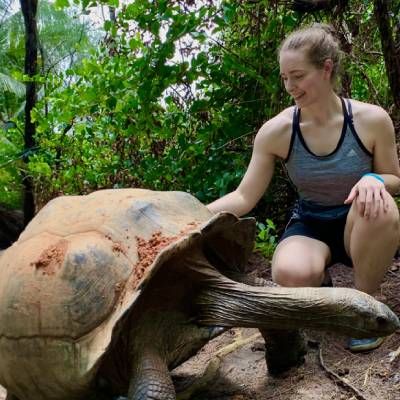
Magdalena Cygan
- Course: MSc Biodiversity and Conservation with African Field Course
- Year of graduation: 2022
- Nationality: British
- Job title: Programme Officer – Green Status of Species
- Company: IUCN (International Union for Conservation of Nature)
1. What have you been doing since finishing your studies?
After completing my MSc, I took a year out to publish my thesis and gain more work experience. This included a three-month field stint in Madagascar contributing to a long-term study on plover breeding biology, where I had the incredible privilege of monitoring chicks from hatching to fledging – there’s nothing quite like watching a tiny beak emerge from its shell for the first time! After that, I took on my current role at IUCN, where I coordinate a global network of wildlife experts to draft and publish Green Status of Species assessments. Over the past two years, this role has taken me around the world to lead talks, trainings, and workshops. It has given me the chance to experience some of the planet's most remarkable species and ecosystems – from the cloud forests of the Seychelles to the highlands of the Peruvian Andes – opportunities I never imagined I’d have so early in my career.
2. What company are you working for, what is your role, and what does it involve?
IUCN (the International Union for Conservation of Nature) is the world’s largest environmental network, bringing together governments, charities, and experts to find solutions to the biodiversity crisis. A key part of its work is producing tools that guide best practice in conservation, the most well-known being the Red List of Threatened Species, which classifies species by extinction risk. Recently, IUCN launched an exciting new counterpart called the Green Status of Species, which tracks how close a species is to full recovery and the impact of conservation efforts. I’m the first person hired to lead its roll-out, so my role is varied and dynamic. In a typical week, I might be training species experts, facilitating assessments, delivering talks and workshops, or reviewing finished assessments to make sure they meet rigorous standards. What excites me about the Green Status is that it shifts the focus from simply preventing extinction to achieving recovery, aiming for species and ecosystems not only to survive but to thrive.

3. Tell us a bit about yourself, your background and what made you choose the University of Leeds?
I was born and raised in Leeds, where I completed my GCSEs and A-Levels at Lawnswood School. A lifelong love of the natural world led me to study BSc (Hons) Biology at the University of Bath, giving me the chance to spend my undergrad years away from home. Confronting the apocalyptic scale of the biodiversity crisis during this time fuelled my determination to do everything in my power to bring about positive change. So, after graduating, I set about finding an MSc course that would equip me with the knowledge and skills to pursue a career in wildlife conservation. The University of Leeds’ MSc Biodiversity and Conservation stood out as one of the few courses tailored to this path. The opportunity to study in a city I already knew and loved, while living at home to save money before embarking on my career, made enrolling at Leeds an easy choice.
4. How do you think the skills and knowledge you developed at Leeds whilst studying your Masters helped with your career? Did you create any industry links or gain any experiences that were beneficial?
Wildlife conservation is a competitive sector, with most entry-level jobs demanding months of relevant experience. My MSc allowed me to get much of the experience I needed at the same time as earning a degree, with modules offering hands-on training in species identification, habitat management, field ecology, and GIS. We regularly had talks by guest lecturers from the conservation sector, providing opportunities to network and seek valuable careers advice. The University’s links with a local ecological consultancy enabled me and other students to gain paid, flexible field experience that fit around our studies. Also, with the support of my supervisor, I was able to publish a scientific paper based my MSc thesis, which I think was particularly decisive in securing my current job.
5. Why did you choose to study your particular course?
Leeds’ MSc caught my eye because of its appealing blend of theory and fieldwork. Offerings like a field trip to Kenya and a practical habitat management course not only excited me, but also gave me an opportunity to gain skills and experiences I’d missed out on as an undergrad due to the COVID-19 pandemic. We conservationists do what we do for love of nature, and what better way to harness that passion than to learn from nature itself?
6. What aspects of the course did you enjoy the most?
Spring and summer were packed with field visits and practical courses, which more than lived up to my high expectations. I was also thrilled to undertake a thesis on African elephant movement patterns, using GPS collar data to address real-world conservation challenges for these spectacular animals. My defining memory from the MSc, however, has to be the African field ecology course in Kenya. Coming face-to-face with African megafauna in their natural habitat is a feeling that’s hard to put into words. My first glimpse of a lion was particularly memorable – it was the last day of the course and my group had all but given up hope of seeing the iconic big cat when, suddenly, we got an alert from a local lion research group that a male they were GPS tracking was in the area. We all hurried to our safari vans and drove after the GPS signal, and lo and behold, there he was, lying resplendent under a thorn acacia. A truly magnificent sight.
7. What does Leeds as a city have to offer students?
I come from Leeds originally, so my decision to return after four years living independently says a lot! The city is buzzing with cafés, live music, pubs and clubs, and with campus right on the edge of town, things never get boring. For wildlife lovers, Leeds is surprisingly green, with pockets of nature scattered throughout the city – I highly recommend the Meanwood Valley Trail, a 7-mile walk through a connected corridor of parks and woods. Yorkshire Dales National Park is also just a short trip away, ideal for hikes or fieldwork. With a large and diverse student community, it’s easy to make friends and get involved in clubs, societies, or volunteering (there’s even a conservation volunteers group!). Overall, Leeds is big enough to feel vibrant and lively, but compact enough to get around and explore everything it has to offer.

8. How did you fund your Masters? Did you receive any funding or a scholarship?
I took out a UK government Postgraduate Master’s Loan.
9. Now that you’ve graduated, what would you say to students thinking about studying your course, do you believe your investment into the course was worthwhile for your career?
Having relevant work experience is key to securing a job in wildlife conservation. This can seem daunting, especially if you don’t have thousands of pounds to spare for fancy overseas voluntourism gigs. My advice would be to make the most of the networks available to you at university – my field role in Madagascar and the chance to publish my MSc thesis both came about through the strong relationships I built with my lecturers and tutors. Show your worth and don’t be afraid to ask for opportunities! Most importantly, try not to get too caught up in the competition or metrics; stay grounded in your love of nature and remember why you’re doing the work. For me, the MSc was absolutely worthwhile – it provided the skills, experience, and connections that launched my career in conservation.
10. What would you say about the learning and the career support facilities in your academic School or Faculty and at the University in general?
The University of Leeds Careers Service is an invaluable resource for soon-to-be graduates. It offers one-to-one careers advice, workshops on applications, interview practice, and more – several of which I made use of as I neared the end of my MSc. There is also dedicated support for those considering a PhD, which some of my peers went on to pursue. A particularly useful tool is the University’s job vacancies database. While it wasn’t where I found my current job, it offers a wide range of opportunities and is a great starting point if you’re feeling lost in your job hunt.

